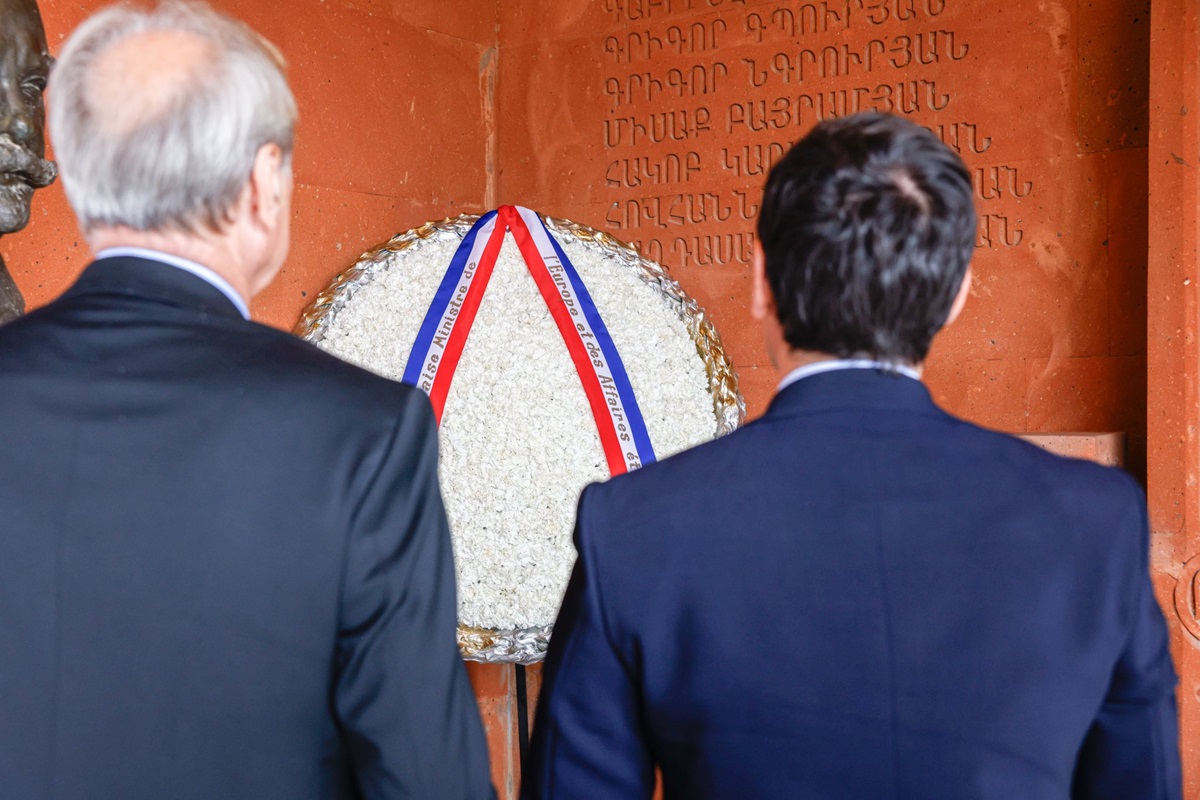Yerevan between France and Russia
The visit to Armenia by Stéphane Séjourné, outgoing French government minister and candidate for European commissioner, was viewed with suspicion in Moscow, which seeks to keep its historical ties strong. While in Yerevan, the ‘minor partners’ of Pašinyan's coalition are collecting signatures for a referendum on the country's entry into the EU.
Yerevan (AsiaNews) - France's outgoing Foreign Minister Stéphane Séjourné, a candidate for EU commissioner, has paid a visit to Yerevan in recent days, arousing highly critical reactions from Russia, which sees in the ‘new idyll’ between Armenia and France an attempt to replace the historic partnership with the Kremlin.
The scientific director of the Institute for International Research Mgimo, the school of diplomats in Moscow, Sergej Markedonov, commented on the situation in an extensive article on the Bunin&Co Telegram channel.
According to the expert, ‘meetings between Armenians and the French have intensified so much that they no longer surprise anyone, they have become a diplomatic routine’. On the other hand, the French also maintain frequent relations with Azerbaijan, maintaining ‘a constant tone of rhetorical struggle’, defending the rights of Armenians with regard to the Nagorno Karabakh situation, but then ranging over the most varied topics. Rather, the Armenians try to accredit the thesis that Paris is becoming Yerevan's most important ally, and a decisive player in the whole South Caucasus area.
Séjourné's visit, however, has a more specific character, according to Markedonov, to which more attention must be paid. On the one hand, he considers the trip to be a ‘farewell tour’ before moving to Brussels in Ursula von der Leyen's government, where he will replace the resigning Thierry Breton. After Armenia, the French minister travelled to Chişinău and Athens, and he has also been in Moldova frequently in recent years, considering the imminence of presidential elections and the referendum for European integration.
Greece is also a long-standing partner of France, as a counterweight to Turkey's interests in the region, and the Greeks' relations with Armenia have developed greatly over the past two years.
On the other hand, the director of Russian diplomatic science notes, ‘one should not forget Armenia's internal political initiatives, which have international significance’. The possibility of the country's inclusion in the EU has been under discussion since June, on the initiative of the ‘Platform of Democratic Forces’, which has been joined by ‘all Armenian Westernists’ such as Aram Sarkisyan, leader of the ‘Republic’ party, Arman Babadžanyan of the ‘In the Name of the Republic’ movement, Tigran Khzmalyan of the ‘European Party of Armenia’, the so-called ‘minor partners’ of PM Nikol Pašinyan.
According to the PM's opponents, these groups are manoeuvred by Pašinyan to test public opinion and propagate ideas that he, for various reasons, does not want to attribute to himself and his own circle. Pašinyan himself has indeed expressed critical opinions in public about Armenia's possible entry into the EU, Markedonov points out, but ‘time is running out, and since September we have been collecting signatures to organise a referendum on the issue’, a campaign that will run until 14 November with the aim of bringing the proposal to parliament, for which at least 50,000 signatures are needed, and ‘obviously Paris fully supports this initiative’.
The political scientist observes that in the current conditions, in which many typical ‘cold war’ approaches are being reformed, the issue of Armenia's relations with Europe must be seen in the context of the global conflict, and this is why ‘Séjourné in Yerevan mentioned Russia, pointing to it as the main obstacle on the road to democratisation and European integration of Armenia, assuring that France will always stand by the Armenian people’.
The French support appears in many respects more rhetorical than concrete, as in the statements of Emmanuel Macron himself and other members of the government in Paris, while ‘Moscow stands by, trying to maintain all its historical ties in the Caucasus’.
Photo: the delegation's homage to the Musa Dagh memorial in Yerevan. Photo taken from the X profile of Stéphane Séjourné







.png)










